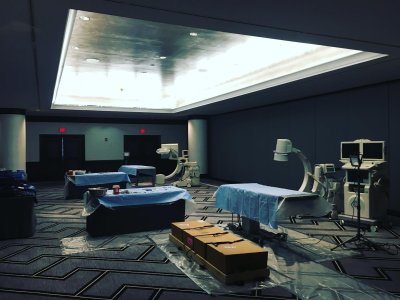Secrets from a chiropractor to body dealer: How this man made a shocking career switch to save himself
- Replies 0
In today’s world, even if it’s unethical or downright immoral, buying a body can be done easily–for as long as you have money. It’s also not governed by federal law, which makes it a gray area that some people can take advantage of.
The journey from a licensed chiropractor to a controversial body broker is a tale that reads like a thriller novel, yet for Obteen Nassiri, it was a stark reality. He decided to take the chance of walking into the aforementioned gray area. Here are the results of his decision.
Let’s delve into the murky waters of the body trade industry, a business that, while legal, often skirts the edges of ethics and morality.
Nassiri's descent from a healthcare professional to a dealer in human remains began with the collapse of his chiropractic practice.
Originally from Iran, Nassiri wanted to become a doctor like his father. He became a chiropractor in Las Vegas, but started to spiral in 2008.
AllState Insurance filed a case against him for running a fraud scheme in which he “allegedly submitted fake medical records and billed the company for the unnecessary treatments for over 150 people.”
After allegations of fraud and misrepresentation, Nassiri found himself stripped of his license and credibility in 2010. Despite this, he continued to practice without a license, leading to warnings of criminal charges if he didn’t stop.
The subsequent legal battles, including an $8.6 million fraud judgment in 2015, left him searching for a new source of income. Despite the resolution upheld and the loss of federal contracts, Nassiri maintained his innocence.

In the face of financial ruin, Nassiri and his brother launched Med Ed Labs, a company that would buy bodies and sell them to organizations for medical training–the brothers registered this as a nonprofit (later losing the designation from the IRS).
The business, nestled between a tattoo parlor and a psychic in a Las Vegas strip mall, quickly grew into a nearly $2 million enterprise. Nassiri's network of suppliers and clients spanned from a prestigious Texas medical school to the U.S. military.
The school charged Med Ed standard rates – $600 for a head; $300 for a pair of feet; $500 for a set of arms; and $1,000 for an entire body. According to the team at NBC, the school’s program garnered at least $82,000 from leasing bodies to Med Ed Labs in the course of 2 years.
Once Mr Nassiri claimed the bodies, he would prepare them for resale at a huge markup. He did not tell the media how much he would charge for each specimen, but a cadaver can go for $3,000 to $5,000, though some can go for as much as $10,000.
He entered into a contract with the US Army and Defense Health Agency, which handles military hospitals and clinics, from 2019 to 2021. Med Ed Labs was awarded more than $570,000 to provide bodies for medical training. They even had deals with medical tech companies to help train doctors.
Selling organs for transplants is illegal, but the trade of cadavers and body parts for educational or research purposes is not governed by federal law. While working on a real human body is one of the best learning tools for aspiring doctors, the lack of regulation creates room for exploitation.
For the tens of thousands of Americans who donate their bodies to science, the lack of regulation means their remains could end up in unexpected places, such as crash test simulations or public dissections.
Nassiri's business practices soon came under scrutiny for ethical violations and legal malpractice, including the mishandling of body parts and going against the wishes of the deceased's loved ones.
Nassiri's dealings included the controversial sale of a 98-year-old, David Saunders, World War II veteran's body, which was publicly autopsied at a hotel ballroom in Portland.
Saunders’ wife wanted to donate her husband’s body to the Louisiana State University medical school, but the school declined due to Saunders’ death from an infectious disease.
The funeral home then referred her to Med Ed Labs, who sold Saunders’ body to DeathScience.org, who conducted the public autopsy. According to Mrs. Saunders, “At no time did they tell me they were going to resell his body. Under no circumstances would I have my husband’s body put on display.”
After this national scandal, the University of North Texas Health Science Center requested a full accounting of any bodies still in the company’s care and for coordination of returning of all specimens and ashes from Med Ed Labs.
A few years later, the medical school noted nine pairs of missing ankles and feet. That same medical school would also claim that Nassiri shipped remains back in “dirty, disintegrating containers likened to scrap cardboard.”
Despite multiple warnings and ethical breaches, Nassiri continued his operations until 2023, when the Department of Justice charged him and Med Ed Labs with fraud. The investigation revealed a pattern of misrepresentation and deceptive practices driven by profit.
Officials from the Army and Defense Health Agency claimed that they were unaware of Nassiri’s suspicious dealings when they made the contracts official.
Following the scandal, Nassiri claimed that Med Ed Labs had filed for bankruptcy in March, and was no longer in business. Nassiri places the blame on his lawyers, saying, “The attorney I had did absolutely nothing; didn't have one witness, not one expert, not in one exhibit during the entire two-week trial in federal court. As a result of that lawsuit, a judgment came our way… that was way too big for us to handle and that led to a massive destruction in my life.”
Souce: CBS News / Youtube.
However, the team at NBC News suggest that he may still be involved in the body trade through a new business registered under his brother's name. In January, a new body broker business named Surgical & Medical Training Services was registered at the former Las Vegas address of Med Ed Labs.
The company’s website looks highly similar to that of Med Ed Labs and Nassiri paid an application fee to launch a cremation and body donation service at the same address.
Meanwhile, Nassiri has rebranded himself as a self-help guru, promoting his “Seven Fs” philosophy–faith, family, friends, fitness, fun, financial security, and fortitude–on social media.

Have you considered donating your body to science? What measures do you think should be in place to prevent exploitation in the body trade industry? Your insights in the comments below are valuable to our community, and together, we can advocate for dignity and respect in all aspects of life—and death.
The journey from a licensed chiropractor to a controversial body broker is a tale that reads like a thriller novel, yet for Obteen Nassiri, it was a stark reality. He decided to take the chance of walking into the aforementioned gray area. Here are the results of his decision.
Let’s delve into the murky waters of the body trade industry, a business that, while legal, often skirts the edges of ethics and morality.
Nassiri's descent from a healthcare professional to a dealer in human remains began with the collapse of his chiropractic practice.
Originally from Iran, Nassiri wanted to become a doctor like his father. He became a chiropractor in Las Vegas, but started to spiral in 2008.
AllState Insurance filed a case against him for running a fraud scheme in which he “allegedly submitted fake medical records and billed the company for the unnecessary treatments for over 150 people.”
After allegations of fraud and misrepresentation, Nassiri found himself stripped of his license and credibility in 2010. Despite this, he continued to practice without a license, leading to warnings of criminal charges if he didn’t stop.
The subsequent legal battles, including an $8.6 million fraud judgment in 2015, left him searching for a new source of income. Despite the resolution upheld and the loss of federal contracts, Nassiri maintained his innocence.

Obteen Nassiri transitioned from a chiropractor to the controversial business of selling dead bodies, including transactions with the U.S. military, after facing fraud allegations. Image source: Med Ed Labs via Facebook.
In the face of financial ruin, Nassiri and his brother launched Med Ed Labs, a company that would buy bodies and sell them to organizations for medical training–the brothers registered this as a nonprofit (later losing the designation from the IRS).
The business, nestled between a tattoo parlor and a psychic in a Las Vegas strip mall, quickly grew into a nearly $2 million enterprise. Nassiri's network of suppliers and clients spanned from a prestigious Texas medical school to the U.S. military.
The school charged Med Ed standard rates – $600 for a head; $300 for a pair of feet; $500 for a set of arms; and $1,000 for an entire body. According to the team at NBC, the school’s program garnered at least $82,000 from leasing bodies to Med Ed Labs in the course of 2 years.
Once Mr Nassiri claimed the bodies, he would prepare them for resale at a huge markup. He did not tell the media how much he would charge for each specimen, but a cadaver can go for $3,000 to $5,000, though some can go for as much as $10,000.
He entered into a contract with the US Army and Defense Health Agency, which handles military hospitals and clinics, from 2019 to 2021. Med Ed Labs was awarded more than $570,000 to provide bodies for medical training. They even had deals with medical tech companies to help train doctors.
Selling organs for transplants is illegal, but the trade of cadavers and body parts for educational or research purposes is not governed by federal law. While working on a real human body is one of the best learning tools for aspiring doctors, the lack of regulation creates room for exploitation.
For the tens of thousands of Americans who donate their bodies to science, the lack of regulation means their remains could end up in unexpected places, such as crash test simulations or public dissections.
Nassiri's business practices soon came under scrutiny for ethical violations and legal malpractice, including the mishandling of body parts and going against the wishes of the deceased's loved ones.
Nassiri's dealings included the controversial sale of a 98-year-old, David Saunders, World War II veteran's body, which was publicly autopsied at a hotel ballroom in Portland.
Saunders’ wife wanted to donate her husband’s body to the Louisiana State University medical school, but the school declined due to Saunders’ death from an infectious disease.
The funeral home then referred her to Med Ed Labs, who sold Saunders’ body to DeathScience.org, who conducted the public autopsy. According to Mrs. Saunders, “At no time did they tell me they were going to resell his body. Under no circumstances would I have my husband’s body put on display.”
After this national scandal, the University of North Texas Health Science Center requested a full accounting of any bodies still in the company’s care and for coordination of returning of all specimens and ashes from Med Ed Labs.
A few years later, the medical school noted nine pairs of missing ankles and feet. That same medical school would also claim that Nassiri shipped remains back in “dirty, disintegrating containers likened to scrap cardboard.”
Despite multiple warnings and ethical breaches, Nassiri continued his operations until 2023, when the Department of Justice charged him and Med Ed Labs with fraud. The investigation revealed a pattern of misrepresentation and deceptive practices driven by profit.
Officials from the Army and Defense Health Agency claimed that they were unaware of Nassiri’s suspicious dealings when they made the contracts official.
Following the scandal, Nassiri claimed that Med Ed Labs had filed for bankruptcy in March, and was no longer in business. Nassiri places the blame on his lawyers, saying, “The attorney I had did absolutely nothing; didn't have one witness, not one expert, not in one exhibit during the entire two-week trial in federal court. As a result of that lawsuit, a judgment came our way… that was way too big for us to handle and that led to a massive destruction in my life.”
Souce: CBS News / Youtube.
However, the team at NBC News suggest that he may still be involved in the body trade through a new business registered under his brother's name. In January, a new body broker business named Surgical & Medical Training Services was registered at the former Las Vegas address of Med Ed Labs.
The company’s website looks highly similar to that of Med Ed Labs and Nassiri paid an application fee to launch a cremation and body donation service at the same address.
Meanwhile, Nassiri has rebranded himself as a self-help guru, promoting his “Seven Fs” philosophy–faith, family, friends, fitness, fun, financial security, and fortitude–on social media.
Key Takeaways
- Obteen Nassiri transitioned from a chiropractor to the controversial business of selling dead bodies, including transactions with the U.S. military, after facing fraud allegations.
- Despite ethical violations and legal malpractice, Nassiri's company, Med Ed Labs, flourished financially by trading in cadavers with inadequate regulation in the body broker industry.
- Nassiri and Med Ed Labs faced charges of fraud from the Department of Justice following accusations of misrepresenting body conditions and origins, and failing to meet ethical standards in handling donor bodies.
- After his business practices came under scrutiny and Med Ed Labs reportedly filed for bankruptcy, Nassiri appeared to remain in the trade with a new body broker business possibly connected to his brother, while also rebranding himself as a self-help guru.
Have you considered donating your body to science? What measures do you think should be in place to prevent exploitation in the body trade industry? Your insights in the comments below are valuable to our community, and together, we can advocate for dignity and respect in all aspects of life—and death.






